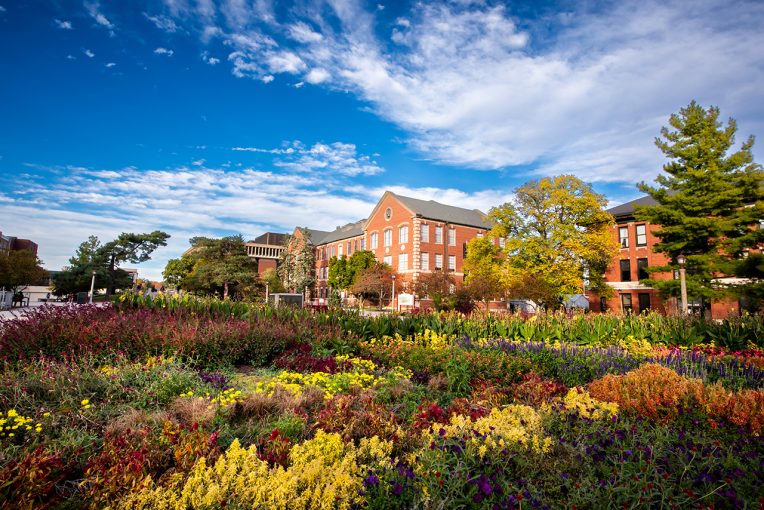Last Updated on March 3, 2025 by Bertrand Clarke
A small but passionate group of Illinois State University (ISU) students and community members gathered at Uptown Circle on Wednesday to voice their opposition to former President Donald Trump’s rhetoric and policies targeting Diversity, Equity, and Inclusion (DEI) initiatives. The protest, organized by freshman history and social science education major Andrew Franson, aimed to raise awareness about what participants described as an alarming shift toward exclusionary and divisive politics.
Despite a lower-than-expected turnout, Franson remained optimistic about the impact of the demonstration. “Even if it’s just a few of us here today, it’s a start,” he said. “Collective action is how we create real change. History shows us that social progress comes from people standing together and demanding justice.”
Franson, a self-identified leftist, drew parallels between the current political climate and historical movements for social change. “For over a century, leftists have been at the forefront of organizing for workers’ rights, civil rights, and equality,” he said. “What we’re seeing now with Trump’s attacks on DEI is part of a broader trend that threatens to roll back decades of progress.”
The protest was sparked by recent comments from Trump, who blamed DEI policies for a plane crash involving an Army helicopter and a passenger jet in Washington, D.C., last month. Franson called these remarks “dangerous and misleading,” arguing that they reflect a growing hostility toward efforts to promote diversity and inclusion.
“Trump’s rhetoric isn’t just misguided—it’s harmful,” Franson said. “He’s scapegoating DEI to push a divisive agenda, and we can’t let that go unchallenged. What we’re seeing is a slide toward authoritarianism, and it’s up to us to stop it.”
The event also featured a speech from Aidan Hanley, a freshman music education major who shared his personal experiences as a visually impaired individual. Hanley spoke about the importance of accommodations and inclusivity in his daily life, from larger print materials to accessible menus at restaurants.
“I’ve never been seen as ‘normal,’ and I’ve faced my share of challenges because of that,” Hanley said. “But the accommodations I receive—whether it’s larger print or a paper menu—make a world of difference. They show that people care, that they value me as a person. And that’s what DEI is all about.”
Hanley expressed concern that Trump’s policies could undermine these vital protections. “What happens if those accommodations are taken away? What happens if our rights are stripped away with the stroke of a pen?” he asked. “We can’t let that happen. We have to stand up for each other and fight for what’s right.”
Franson echoed these sentiments in his own remarks, emphasizing the need for solidarity among working-class people. “We live in a society with more than enough resources to provide for everyone,” he said. “Yet, instead of ensuring that people have what they need, our system prioritizes profits over people. That’s why we have to keep fighting—for ourselves, for each other, and for future generations.”
The protest also drew the attention of ISU President Aondover Tarhule, who passed by Uptown Circle as the event was winding down. His presence prompted mixed reactions from attendees, with some expressing frustration over what they perceived as a lack of institutional support for student activism.
Franson, however, remained focused on the bigger picture. “This isn’t just about one protest or one issue,” he said. “It’s about building a movement. Students have always played a crucial role in driving social change, and we need to keep that tradition alive.”
He urged his peers to stay politically engaged and to challenge systems of power that perpetuate inequality. “Capitalism thrives when we’re passive, when we don’t question the status quo,” Franson said. “But we can’t afford to be silent. The stakes are too high. Whether it’s fighting for DEI, workers’ rights, or climate justice, we have to keep organizing and pushing for a better world.”
The protest may have been small, but its message was clear: in the face of divisive rhetoric and policies, students and community members are determined to stand together and advocate for a more inclusive and equitable society. As Franson put it, “Change doesn’t happen overnight, but every step we take matters. Today was one of those steps.”
The event concluded with a call to action, encouraging attendees to stay informed, get involved in local politics, and continue the fight for social justice. For many, it was a reminder that even in the face of adversity, collective action can spark hope and inspire change.
“We’re not just protesting Trump,” Hanley said. “We’re standing up for what we believe in—for diversity, for equity, for inclusion. And that’s a fight worth having.”












